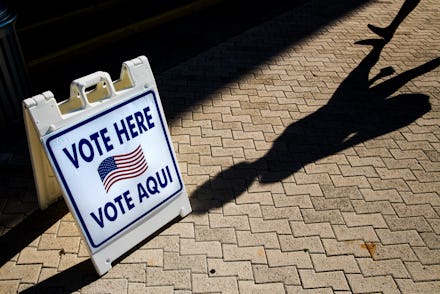This appeals court just granted former felons in Florida a big win for voting rights

For a moment after the 2018 midterm elections, it seemed that 1.6 million Floridians (or roughly 25% of the nation’s disenfranchised formerly incarcerated population) would get back their right to vote via Amendment 4, also known as the Voting Rights Restoration for Felons Initiative. Upon being convicted of a felony, residents in Florida are barred from voting, but Amendment 4, which was approved in the 2018 vote, was set to do away with this practice of disenfranchisement.
Instead, in June 2019, Florida Gov. Ron DeSantis (R) signed legislation proposed by the state’s Republican Party that would institute an effective poll tax. The bill made it so that people with past felony convictions couldn't vote until they paid off any financial penalties associated with their conviction, like court costs and other fines. Of course, many returning citizens don't have the spare cash on hand to pay fees — even small ones — and the financial burden in that case is enough to once again deny them their vote.
That June, the Brennan Center, the American Civil Liberties Union (ACLU), and the NAACP Legal Defense Fund sued the state on behalf of formerly incarcerated Florida citizens. And this week, in what activists and legal scholars are heralding as a win for voting rights and criminal justice, a federal appeals court ruled that all Floridians — no matter what fees or fines they may owe to the state — are guaranteed the right to vote.
"Nearly everybody that has a conviction in Florida state has hundreds of dollars in outstanding financial obligation."
The three-judge panel of the 11th Circuit Court of Appeals agreed with Amendment 4 proponents, backing the more than 65% of Floridians who voted in 2018 for re-enfranchisement. “Despite the state’s best efforts to dismantle Amendment 4 ... today’s ruling affirms what Floridians intended when they passed Amendment 4 — to restore to returning citizens their right to vote,” said Daniel Tilley, legal director of the ACLU of Florida, in a press release Wednesday regarding the ruling.
Unfortunately, though, Amendment 4 being upheld won't automatically make voting easier for returning citizens. "You have to think that the state knows that putting the onus on the individual voter, people are going to be dissuaded from voting given the confusion," Julie Ebenstein, a senior staff attorney with the Voting Rights Project at the ACLU, tells Mic. Florida kept no centralized database of court fees and fines owed, nor did the state offer guidance on how residents could access that information. That meant that formerly incarcerated individuals didn't know how much money they owed to the state, or if they owed any at all; it was also unclear where fines could be paid off. The disarray was made worse by the fact that if someone was convicted in various counties or under different names (use of a middle name versus a middle initial, for instance), there wasn't any way to cross-check for these discrepancies.
And, of course, the justice system has a certain inherent motivation in keeping financial penalties in place. Ebenstein says that Florida courts are funded by the fees and fines by the users of the court system, so withholding the vote for cash literally pays off for the state. "Nearly everybody that has a conviction in Florida state has hundreds of dollars in outstanding financial obligation," she tells Mic, via the variety of costs a user of the court accrues — in everything from applying for a public defender ($50) to being on probation, which mandates a monthly fee at least $50 be paid to the Department of Corrections.
Advocates argue that people who spent time in jail already paid their debt to society through time served, and that the attempt to impose financial barriers to voting only makes re-entry to society more difficult; people with criminal records also face hurdles obtaining jobs and affording housing or higher education. As Tranassa White, a formerly incarcerated individual, wrote in a blog post for the ACLU: “I have two minimum wage jobs, an education that I can’t afford, and every day I make the difficult decision to either buy groceries or pay money towards getting my driver’s license.” In Florida, residents can register to vote with either a driver's license or Florida identification card.
Florida, like most other states in the country, used to permanently disenfranchise residents with past felony records and convictions, a practice the Brennan Center says “can be traced back to early colonial law in North America” and only really made waves after the end of the Civil War and passage of the 15th Amendment, which gave Black men the right to vote.
It's not all good news, though. Even if the franchise has been legally restored for returning citizens, "the state has really failed to give voters adequate guidance on who's eligible to register to vote and how they should go about doing so," Ebenstein says. During the six months between when Amendment 4 went into effect and when DeSantis signed the fee-imposing legislation, formerly incarcerated people may have registered to vote, but it's unclear whether that registration will be validated in time for the primary election. Ebenstein says that many Floridians "feel like they're in limbo" trying to figure out the intricacies of the newly upheld ruling.
Wednesday's ruling also came one day after the deadline to register to vote in the Florida Democratic and Republican primary elections, which means the Floridians in question have been robbed of their first major voting opportunity. Florida's primary will take place on March 17, 2020.